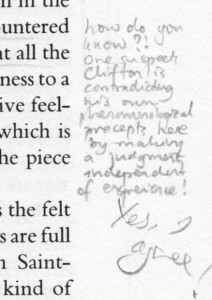
As you leave the Institute of Education library, there’s a montage of photographs showing the awful things that people have done to books, like water damage and coffee stains, highlighting and tearing, as a reminder to treat their books nicely. Writing in books, particularly library books, is a real annoyance. But occasionally, you come across a bit of marginalia that is so enlightening, and as in the case I’m about to relate, so charming, you have to forgive the reader for taking their pencil to paper. (But don’t do this at home, and particularly not with an IoE book).
The book in question is Thomas Clifton’s Music as heard: A study in applied phenomenology (1983). It’s very difficult to get hold of, and I’m so glad that Senate House library had one (as I’ve remarked before). I’m thoroughly enjoying it because Clifton gets at a point which is very relevant for my research: Music analysis that explains how a piece of music was constructed says very little about the way that you actually experience music. But on page 75, there’s a bit about the relationship between feeling and reflection where he seems to slip into a very dodgy value judgement about rock concerts. It’s at this point that a previous reader, who has commented in pencil several times in the margins with very small, neat handwriting, has underlined Clifton’s sentence (“We have encountered the resultant spectacle at rock concerts, where the music is not at all the main attraction but a side show”) and then written in the margin:
“How do you know?! One suspects Clifton is contradicting his own phenomenological precepts here by making a judgement independent of experience!”
And underneath, another reader has written in a larger, more exuberant hand
“Yes, I agree!”
Now I know I shouldn’t be advocating writing in library books, but this bit of marginalia is a really useful commentary on Clifton’s book, and a heartwarming proof that two previous readers had given close attention not just to the text, but to the marginalia as well.
For the record, I agree! too: I think Clifton is wrong here, too, because everything he says about rock concerts could be said of classical concerts (that we may ‘run the risk of submerging into our own feelings and confusing the expression in the music with the spontaneity of our own responses’). It seems strange for a phenomenologist to ascribe a mode of listening to an event or a musical genre rather than to individuals attending the event and experiencing the music, but if I’m not wrong, I think that betrays a prejudice against rock music that made him drop his phenomenological guard. All of which I might not have given so much attention to if two people hadn’t defaced the book.
There are plenty of solutions to this out there – annotatable pdfs, or tagging and note-making in Zotero groups for example. But there’s something about holding and reading a book that someone else has held, transported back and forth to a library, and inscribed literally with the mark of their hand, that is phenomenologically different to the experience of tagging an electronic file, and that’s yet another reason why physical books will always win out for me over the electronic.

